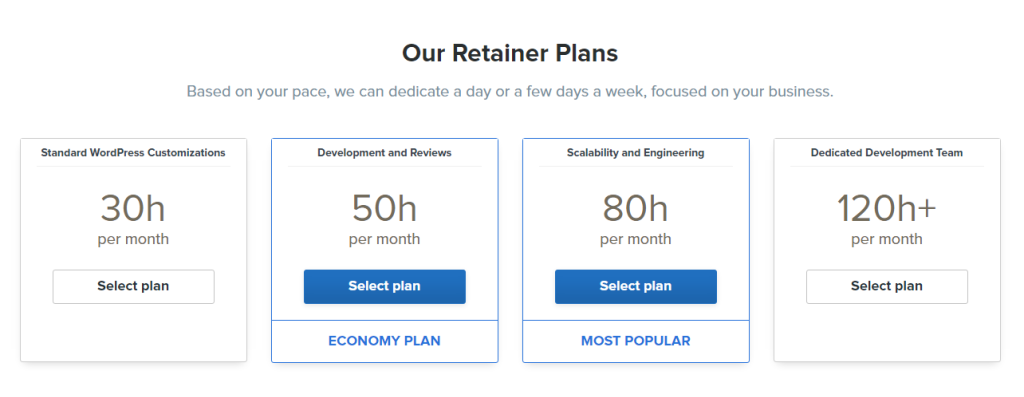WordPress agencies (and WordPress freelancers) are creative business entities that help provide online solutions and presence for their clients – other businesses. If you are the owner of such a WordPress agency or are employed by one, you know that in order to stay profitable a WordPress agency must have a constant flow of customers and projects, running back to back.

Many agencies attest that they would love to be able to allow their team a little breathing buffer between one client’s project and the next. Or, maybe even be able to pick & choose the clients they want to work with by simply saying “No, thank you.” to the pesky ones.
Sure, you could stretch the agency to the very limit and try to finish 400+ WordPress projects in 7 months and then take a looooong vacation, but, have you ever tried thinking about a different, less exhausting, way of running a successful WordPress business?
Let’s dive into some viable options:
Recurring income in WordPress via services
One increasingly common way agencies and freelancers are embracing recurring income is by having their clients sign a “WordPress retainer” agreement. That sort of agreement (usually) means that the client will continuously be paying the agency, and in return, will be entitled to expect WordPress technical support/maintenance/design, or in other words, whichever services that WordPress agency has to offer, for as long as the agreement is held.

Essentially, what it means is that the WordPress agency is packaging some of the services they offer as products.
In fact, the WordPress retainer works so well that many professionals take advantage of various automation tools to manage all of their clients’ websites from one convenient place.
Why does it work so well?
From the client’s perspective:
WordPress retainers are a tempting option to go with, assuming that the client had already realized that there’s more to an online business than just building a website. They know that stopping there will not get them very far, from a financial perspective:
- Their website needs to always stay stable, updated and secured, even if the business/traffic is scaling.
- Their online presence needs to be able to support the company’s efforts to market itself and obtain new clients through dynamic marketing funnels. This means it might need to get updated/adjusted from time to time, according to the business needs.
From the WordPress agency’s perspective:
With a long-term WordPress retainer agreement, the agency is likely to be better equipped to understand its client’s needs. As mentioned above, the “Wham-bam, thank you ma’am” approach, which only involves designing & developing a website, fails to address many issues the client might be experiencing and therefore might not be a complete solution for them. The WordPress retainer enables the agency to provide a solution that is better customized and of a higher quality, because they are able to iterate and tune it, according to the customer’s feedback. This is very likely to increase the client’s satisfaction overhaul, as well as improve the agency’s reputation in the industry.
While a retainer agreement will usually involve relatively more moderate sums of monthly payments, it does allow the agency to have a more steady flow of income, alongside its other, bigger projects.
Not bad!
Recurring income, the next level!
While many WordPress agencies have already figured out the benefits of the WordPress retainer, and have been implementing it for quite some time, only very few have transitioned to the next phase. What I’m talking about is an ability that pretty much any WordPress agency possesses, by definition; by building and creating creative WordPress solutions for your clients your agency is more than half the way there. All that’s missing is to turn it into a WordPress product, i.e., recurring income. Instead of charging only one client for all that work – your agency will be able to charge multiple users for it.
Simple & genius.
The recipe
Here’s a straight-to-the-point recipe of how just about any WordPress agency can quite easily turn its client work into a recurring income:
The ingredients:
- A WordPress agency
- A client in need of a solution
- Your creative solution to the problem (just the rough beta version, at this point)
- A few beta-testers (can be the actual client with the problem, as well as additional clients of the agency who would find it useful – you’re going to need their honest user-feedback)
- A mechanism for: hosting + secured distribution + licensing
- A landing page for marketing purposes
- A sales page (for payment & checkout)
The preparation process:
Let’s go over the preparation steps using the above-mentioned ingredients and see how to mix it up into a full-blown WordPress product for sale:
- Assuming your agency has some experience in the WordPress sphere, you have undoubtedly come across problems/lacunas that require a solution. In fact, your agency may have already built some internal WordPress plugins to bridge any gaps or difficulty it had encountered working with WordPress daily. Dig deep into your archives and create a list of those. Write what is the problem and what’s the suggested plugin/theme to address it.
- Next, work to narrow down your list to only include solutions that might be worth turning into a product. The main consideration whether or not to include one in your shortlist should be:
“Is this problem a recurring one? Is it possible that multiple WordPress users might be in need of a solution for it?” - Finally, pick one of the problems on your shortlist to go with. It might be a little difficult to make the pick for the one you’re going to build a solution for, but once you realize you are going to repeat this process in the future – making the choice is going to become easier.
- Perform some market research to see if anyone had already released a similar solution to what you had planned on creating. It’s highly likely that if you do your research right you WILL encounter “competition”, but that’s definitely not a reason to hold you back. On the contrary! if you find out a competitor solution is doing well and has many users – that’s actually encouraging because it means there’s demand for it :).
So, simply check out the existing implementations and see if there’s anything you’d do differently and write it down. - Create your own agency’s rough (closed beta version) solution for the problem. Be sure to characterize & build it as a standalone, premium WordPress plugin or WordPress theme from the get-go.
Pro tip: before you insert it into your team’s ToDo list – try to locate a client who’s experiencing the problem for which you decided to build a solution. The idea is to have a sponsor for all of the characterization & development costs, so if necessary, offer to build it for them at a lower cost, or for a reduced recurring usage fee. It’s a win-win because they’ll be getting a solution to their problem and you’ll be getting a sponsor for your work, as well as some enthusiastic beta-users. - Make sure to get your beta-users’ detailed feedback on your solution and the implementation at a relatively initial point, and make any required improvements and adjustments, prior to actually opening it up for public use.
- To be able to sell your WordPress plugin/theme – you’re going to need to have:
- A PCI compliant secure checkout
- Software licensing management (remember: we’re talking about a product, not a one-time client job)
- Subscriptions / Recurring payments with automatic renewals
- An automatic software updates mechanism, which should be linked to your licensing system (to restrict updates only for customers with a valid license).
- Email a secure download link
- Super important, but technically not mandatory for selling: usage tracking & analytics.Implementing all of the items under this bullet would take a heavy toll on your WordPress agency. It would mean your developers will have to focus on building all of these “meta-mechanisms”, rather than on your actual WordPress plugin/theme.
Apologies about the following blatant promotion, but instead, you can integrate your solution with Freemius to get all of the above-mentioned functionality in a jiffy. Seriously, ALL of the above-mentioned capabilities, and more.
- Now that all of the technicalities are taken care of and your solution is ready to come out of the beta-phase, there are three options to go with, as far as marketing and making the sale:
- The first and most obvious sale for WordPress agencies goes directly to their existing client base. You know these people and are engaged in business with them anyway. When you recognize a client project for which your product makes a good fit – simply upsell it to them. This is not only the easiest option for agencies but also the one with the highest payback, as the communication channel is direct and private. No competition – just premium prices.
- Another obvious option that enables you to publicly market your solution is to set up a landing page. Have the page tell the story of your product, and let visitors know what they’ll be getting and how is it going to help them if they install it on their WordPress website.
On your promotional landing page – embed a buy-button to instantly run the checkout procedure and send them a confirmation email with their license and the plugin/theme download. - The option that is likely to get your product the fastest distribution and exposure is to release a free version of your plugin/theme through the official WordPress.org repository. Then, using Freemius, you can upsell your plugin/theme directly within the WordPress admin dashboard. This is AKA the freemium model.
- After sales and recurring payments (yay!) begin to flow in – celebrate & continue to iterate on your product, adding requested features and supporting existing clients, as well as marketing it to new prospects to help it grow and blossom.
- If you enjoyed this process and found success in it – simply go back to your solutions shortlist and repeat, from the top.
Why does it work so well?
From the client’s perspective:
Clients are looking for useful tools to solve difficulties they come across while managing their WordPress websites.
- Most WordPress website owners will be looking for an existing product – a WordPress plugin/theme. If more WordPress agencies create more high-quality WordPress plugins and themes – more site owners will get access to solutions they may not have been able to use otherwise by hiring an agency to perform costly custom work for them.
- When you update your product and add new features & capabilities to it – all of the users benefit from it automatically. That holds true even if your agency is hired and sponsored by 1 client to perform enhancements or add a missing feature. Everyone wins.
From the WordPress agency’s perspective:
I have many reasons I can think of for why going ‘product’ is great for WordPress agencies so I’ll try to keep this part brief:
- Quality – The best creations you are going to make are solutions to problems you yourself are experiencing, because you personally relate to them, and are bothered by them. On the other hand, when solving someone else’s problems you are naturally less invested in the process.
- Money – Naturally, it is far more profitable to solve a problem for many site owners than it is for one site owner.
- Reputation – when you build a successful solution for a specific problem you (the business) become an authority on that matter. Your existing customers will become your best ambassadors, and others will come to you for advice on that topic, which can, in turn, lead to further business opportunities for your company.
Additional inspiration
If you feel like you need to get inspired by another success story before you’re officially hooked on the WordPress product approach – check out the following talk by Matt Cheney. This talk was held at the last WordCamp Europe in 2016, where he shared his experiences from the process of creating a successful product company out of a web agency:
Final thoughts
I don’t wish to get the wrong impression across, so I’ll say this clearly:
Doing WordPress and web client work is a lot of fun, and I’m sure that there are many agencies out there which are perfectly happy with the way things are currently working out for them, and that includes their financial income.
Great!
With that said, however, and I’ve heard this complaint raised multiple times from various agency founders and their employees, doing projects for clients is very limiting in the sense that you almost never have enough time (or budget, for that matter) to realize the project the way you sincerely envisioned it. You work for an external decision maker, and they are the ones navigating the project according to their constraints and opinions. Try to remember how frustrating it is for creators and makers in your agency who want to be able to produce their best outcome but are limited by these circumstances of hourly client rated work.
What I provided you and your WordPress agency in this article is a way out of this cycle. A way to become product people/companies, if not entirely then in combination with client work. I’d say it’s definitely worth thinking about, and in case you think it currently does not suit the state of things at your agency, it’s still important to have this sort of option in the back of your head as a future business opportunity for your agency.
Lastly – forward this to a friend at another WordPress agency – they’ll thank you later.

Leave a Reply